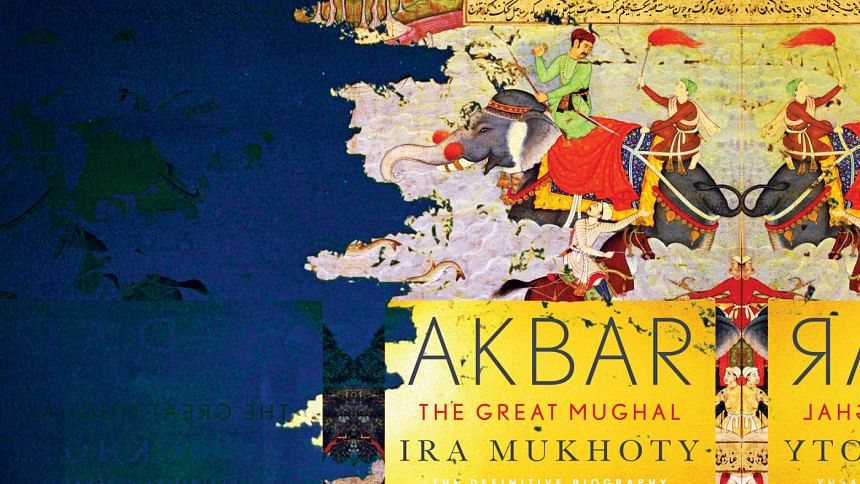Technicolour Mughals: Ira Mukhoty brings Akbar to life

STAR BOOK TALK: Akbar, The Man Behind The Legends Posted by The Daily Star on Wednesday, July 29, 2020
Humans are a storytelling species. Yet history, which is but the stories of yesteryears, is taught like a chain of facts and dates. We remember kings and conquerors but neglect the finer details—their hobbies and jokes, their families, society and the books they read—that transform history into a living, breathing story that we can pass on for generations. This transformation is what Ira Mukhoty attempts in her book, Akbar: The Great Mughal (Aleph Book Company, 2020).
Mukhoty is in equal parts a storyteller and a historian. She weaves tales that are peppered with sources and citations, all the while using vivid imagery that transports one back to the past, so that Akbar ceases to be a historical figure and becomes a man whose victories we rejoice and whose flaws we condemn.
One of Mukhoty's key tools in countering the often dull highbrow academic façade is found in her use of sources. While most historians stick to written primary sources, especially for a time so well documented, Mukhoty also considers the art made by and in response to Akbar. She scours the pieces for clues relating to his and his courts' activities and recounts the stories behind their creation—the most significant of which would be the Hamzanama and the sprawling Akbarnama and Ain-i-Akbari. In doing so, she expertly melds art history with historical texts, and fleshes out the world Akbar lived in far more vibrantly than most other historical accounts.
Indeed, this fleshing out is so prioritised that it is quite a few pages into the book until Akbar himself takes centre stage. Mukhoty takes her time to show us what kind of men Babar and Humayun were as emperors, conquerors, and fathers. We spend time with Akbar as a child, when he hated formal education due to what modern scholars believe was dyslexia. We see him as a rambunctious teen, wrestling elephants for naught but glory.
We also witness his relationship with his mother Hamida Banu and wet nurses, especially Maham Anaga—both the spoiling and reprimanding—and how integral they were to his rise as a political powerhouse. Mukhoty highlights their ambitions, the sociological circumstances that led them to influence Akbar as they did, and how they used their limited means to make lives better for women in the Mughal court. When contrasted with many women who are left in the margins of history and the hundreds if not thousands of books written about the likes of Birbal and Bairam Khan, it is incredibly refreshing to see the women in Akbar's life and in the Mughal court given due spotlight in the narrative.
Mukhoty similarly examines Akbar's courtiers and ministers and shows us what made them tick. For a while, the growing ambitions of Bairam Khan and his cold war with Hamida Banu and Maham Anaga become the driving plot of the book, culminating in Khan's fall from grace. For another, the brewing dissent from Uzbeks becomes the focal source of tension, while the threat of rebellion by other Timur heirs looms consistently over Akbar's strategic command over his empire. These details are not just relegated to isolated parts of the book but are braided in throughout the tome so that the story becomes not just about Akbar, but about how his entire court functioned and interacted.
While both her content and approach are unique, and the book is at its best when Mukhoty adds her artistic flourish to the prose, there are long stretches when the text seems to drag on with names and events. This is exacerbated by her pacing, which often times builds to a climax at the end of a chapter, only for it to be resolved within a paragraph or not addressed until much later, when the details have become murky with the sheer amount of information presented to us. This can make it hard to retain the attention of a non-academic audience.
Regardless, Ira Mukhoty's biography is a nuanced and exhaustive take on a man so glorified. Using text, images, and informative supplementary material before and after the text proper, she presents Akbar and those around him with detailed context and prose befitting that of a story. She also demonstrates the intellect, traits, and emotions with which a 13-year-old boy mourning his father's death grappled with an empire thrust prematurely at him, and expanded it into one of the largest and most innovative empires in the subcontinent's history.
Yaameen Al-Muttaqi works with robots and writes stories of dragons, magic, friendship, and hope. Send him a raven at [email protected].

 For all latest news, follow The Daily Star's Google News channel.
For all latest news, follow The Daily Star's Google News channel. 



Comments